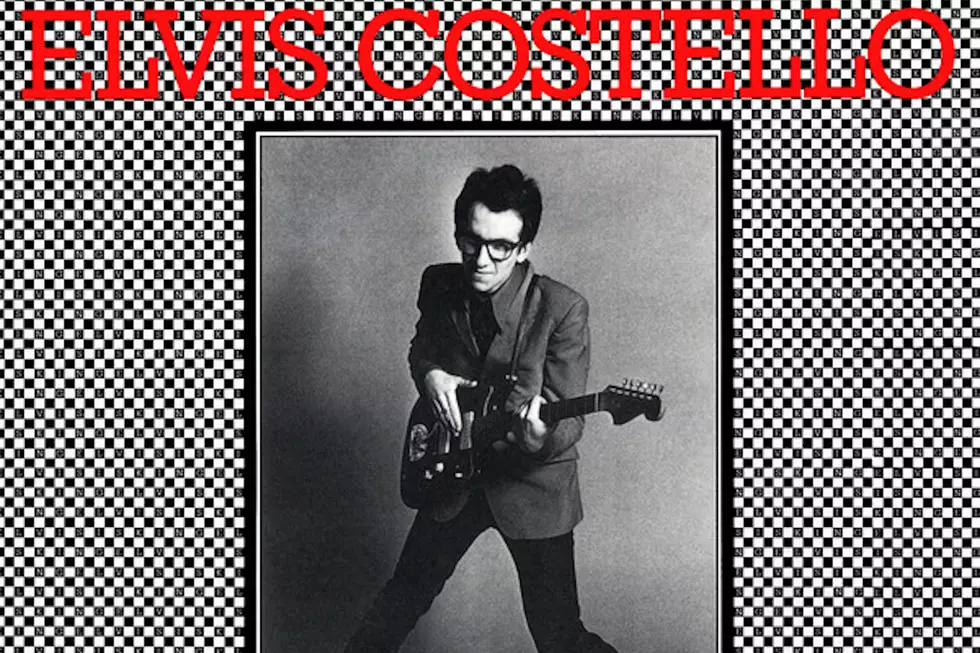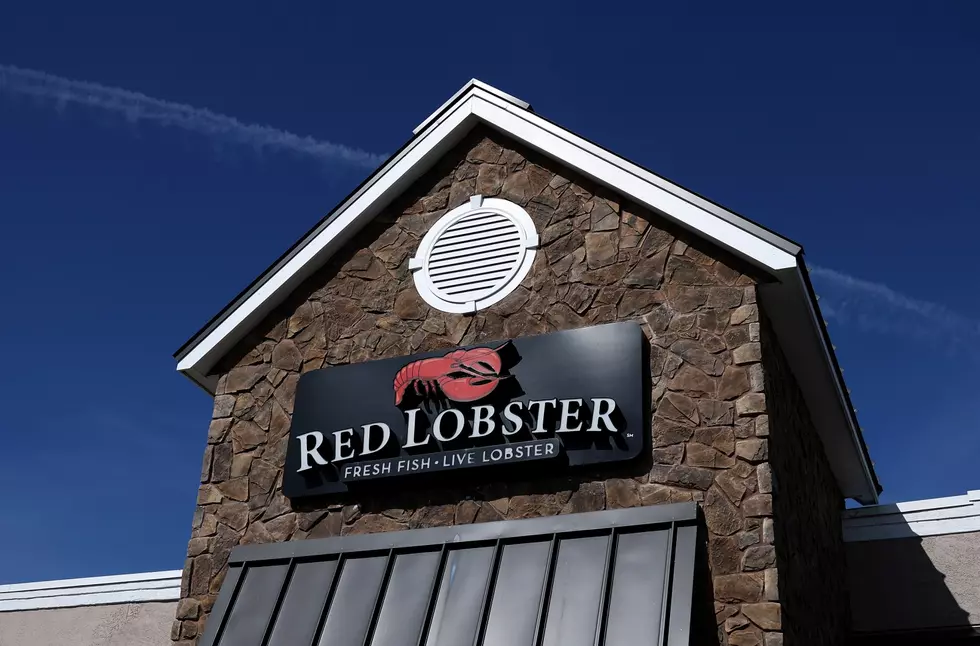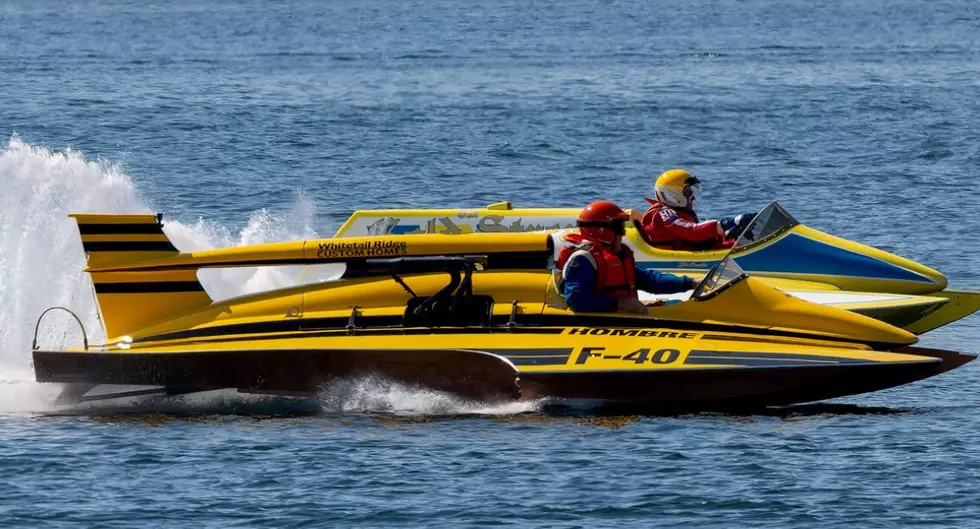
How Elvis Costello Introduced Himself With ‘My Aim Is True’
The unsigned Elvis Costello wasted no time in 1976 when he learned that a buzzy London-based label was looking for new talent.
“I was the first songwriter through the door after reading an announcement that Stiff Records was open for business," Costello wrote in his 2015 memoir, Unfaithful Music & Disappearing Ink. He took a sick day from his computer-operator job at Elizabeth Arden and hurried to the label office, where he left a home-recorded demo with the receptionist. She assured Costello that the tape would be auditioned, then returned to him.
Outside, Costello ran into Nick Lowe, who was already signed to Stiff. "Nick said, 'Are you going to tread the planks again anytime soon, old chap?' and we stood there for a moment like two old vaudevillians chatting at the stage door of the local music hall," Costello recalled. They parted ways, but not for long: Unbeknownst to Costello at the time, Lowe would become his producer.
The son of a successful musician himself, Costello started his first band when he was only 16, pairing with Allan Mayes to form a folk duo called Rusty. But he kept several side hustles going along the way, including his day job at the cosmetics company, while eagerly waiting on a new opportunity. Fortunately, Costello already knew one of the heads of Stiff Records: Dave Robinson had invited Costello to record some of his solo songs in 1975, as well as some music with Costello's band at the time, Flip City – but nothing became of the sessions.
This time would be different, though there was still an adjustment process. "Given my unpromising appearance, Dave and [Robinson's partner] Jake [Riviera] probably saw me more as an in-house songwriter for other artists than an actual recording star, but a modest recording session was planned by way of an experiment," Costello wrote. Riviera suggested Costello make the switch from his current stage name "D.P. Costello" to "Elvis." "Then they handed me a pair of horn-rimmed glasses and said, 'Put these on.' It was like Superman in reverse."
Listen to Elvis Costello's 'Less Than Zero'
Lowe served as producer, while Costello was backed up by a country-rock band from California called Clover, which consisted of guitarist John McFee, bassist John Ciambotti, keyboardist Sean Hopper and drummer Mickey Shine. They'd moved to the U.K. after developing a small cult following. Costello would later recall how much he learned from Clover, though they made for a somewhat unlikely pairing.
"I’m not sure that Clover had heard any of the East Coast music to which I was listening while writing songs like 'Waiting for the End of the World,' 'Less Than Zero,' and 'I’m Not Angry' — whether it was the Velvet Underground, Bruce Springsteen, or a current group like Television," Costello said.
Together they lived and rehearsed at Headley Grange, a stone house about an hour and a half outside London that had once served as an orphanage and workhouse for the poor but had since been converted into a private residence where the likes of Led Zeppelin and Genesis had written music.
The actual recording took place, with few overdubs, at the eight-track Pathway Studios in London. Most of the songs that ultimately appeared on My Aim Is True had either come from Costello's previous demo tapes or were written on the spot while he still worked his office job. There were six four-hour sessions from late 1976 to early 1977, costing a total of about $6,249 at the modern exchange rate.
Still, even after the album was completed, there was no set release planned for the music.
“I took to turning up unannounced at the Stiff office after my working day," wrote Costello, who didn't quit the job until July 9, 1977. "It was just a dogleg of a journey on the Underground, long enough to come up with a new lyric or a chorus or two. I was hoping for news that my record would be released but there seemed to be a queue of old cronies and people of the moment to be released ahead of me.”
Listen to Elvis Costello's 'Alison'
A handful of singles were released first. March 1977 brought "Less Than Zero," a slinky number about Oswald Mosley, the leader of the British Union of Fascists. Only later did Costello learn that the name confused American audiences, many of whom thought he was referring to President Kennedy's assassin, Lee Harvey Oswald. (Costello would later write new lyrics for the song, a "Dallas version," to reflect the confusion: "Jenny takes her clothes off in succession / while her husband rides a bumper in the President's procession.")
The next single was "Alison," from which My Aim Is True took its title. It's a tender track that Costello claimed was written about a woman he saw working in a grocery store, with a chorus based on the 1973 Detroit Spinners' song "Ghetto Child." Melancholy and impenetrable, "Alison" wove an entire tragic story of a woman whose pretty fingers are left lying in her wedding cake: "I know this world is killing you."
Neither single charted, but things finally began to gain momentum when My Aim Is True was released on July 22, 1977. Heard together, Costello's songs were an explosive combination of rock 'n' roll, power pop, punk and new wave, starting with the bitter one-and-a-half minute ode to being employed, "Welcome to the Working Week," through to the unearthly train trip known as "Waiting for the End of the World." In between was a razor-sharp commentary on romantic relationships, forbidden or not; society at large; and women as both the cause of heartbreak and victims of it themselves. A steady stream of cynicism and distrust ran through My Aim Is True, all on top of a thick bass line.
Then, just a few weeks after the album was released, Elvis Presley was found dead. The news in some cases hurt Costello's forward progression — several British publications canceled their coverage of him in favor of pieces about Presley – but also ironically boosted his stature. The name "Elvis" was suddenly everywhere. (On My Aim Is True, "Mystery Dance" boasts a rockabilly roll that sounded close to something the King might have recorded himself.)
This was close to the peak of British punk — the Sex Pistols and the Clash also released debut albums in 1977 – and yet Costello was coming from a different world: He was married to his first wife, and with a young son at home.
"All of this was pretty new to someone living in the suburbs," he wrote in the liner notes for a subsequent reissue of My Aim Is True. "I got most of my musical ideas from records. With a young family to provide for, I didn't have the money for going to clubs. The morning after the Sex Pistols created outrage by swearing on national live television, I was in a commuter train carriage full of scandalized tabloid headlines and high blood pressure."
Watch the Music Video for Elvis Costello's 'Watching the Detectives'
It didn't mean he wasn't intrigued.
"I spent a lot of time with just a big jar of instant coffee and the first Clash album, listening to it over and over," Costello added. "By the time I got down to the last few grains, I had written 'Watching the Detectives.' The chorus had these darting figures that I wanted to sound like something from a Bernard Herrmann score. The piano and organ on the recorded version were all we could afford."
Still, Costello's perceived anger felt sharper and more angular than that of the Pistols or any of the other punk acts at the time, an attitude that extended into his interactions with the media. Perhaps his most quoted lines arrived in a contemporary interview with NME: "The only two things that matter to me, the only motivation points for me writing all these songs are revenge and guilt. Those are the only emotions I know about, that I know I can feel. Love? I dunno what it means, really, and it doesn't exist in my songs."
Costello also revealed that an encounter on a train with Nick Kent, the NME journalist who was interviewing him, served as inspiration for one of the album's characters: "You were obviously pretty 'out of it' 'cos you didn't even notice all the other people in the compartment staring at you," Costello said. "I was just amazed that one person could draw that much reaction from others. After I saw you there, I came up with ['Waiting for the End of the World'] You're the guy in the opening verse": "The man from the television crawled into the train / I wonder who he's gonna stick it in this time."
Notwithstanding Costello's clear success, Riviera admitted he'd taken a big chance. Costello's tape had been the first one through the door when Stiff announced they were accepting new artists. "It was so weird," Riviera told NME, "because I immediately put it on and thought, 'God, this is fuckin' good' — but at the same time I was hesitating because after all it was [his] first tape and I wanted to get a better perspective."
Costello was considerably young to be writing songs with such bitter maturity, but he also wasn't about to let it define his career, especially not at the very beginning. "See, I'm 22, that's only one year older than Johnny Rotten, isn't it?" he told NME. "I just don't want to become the 'elder statesman of punk' or whatever, which is just what [Pete Townshend] got locked into back in the '60s. It's a dangerous position."
Listen to Elvis Costello's 'Waiting for the End of the World'
A rumor swirled that Costello kept a little black book with the names of those who had wronged him or whom he disliked. He denied it but acknowledged that cynicism played a large role in the art he created. “This vindictiveness is an element of my character," Costello told the Guardian in 1977. "It’s not necessarily a good thing. I wouldn’t hold it up as a virtue, and I find it quite hard to live with sometimes – but you can only be what you are. You can force other things but sooner or later your natural tendencies will surface.”
In the end, Costello wasn't interested in becoming a poster child for revengeful songwriting. "If someone gets the impression of me as the patron saint of losers, they’re going to get a big shock," he said. "I don’t intend to pander to any particular image."
Clover went uncredited on the album for contractual reasons, but their members would find their success down the road: McFee joined the Doobie Brothers, while Hopper helped found Huey Lewis and the News. Costello formed a new backing band called the Attractions in the summer of 1977 and began regularly performing live.
Meanwhile, My Aim Is True drew praise from critics who were impressed with Costello's clever word play and sophisticated songwriting. Not long after Presley's death, My Aim Is True made it to No. 14 on the U.K. chart. In America, it reached No. 32. Costello's stellar career was underway.
"There was at least as much imagination as experience in the words of this record," Costello said in the My Aim Is True reissue liner notes. "Whatever lyrical code or fancy was employed, the songs came straight out of my life, plain enough. I hadn't necessarily developed the confidence or the cruelty to speak otherwise."






